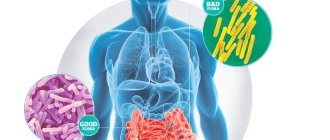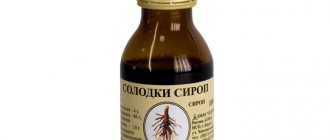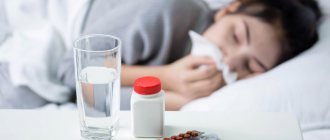The human intestine contains a great variety of different bacteria and microorganisms, both beneficial and pathogenic. The largest number are lactobacilli and bifidobacteria. There is a kind of balance in the numerical ratio of all intestinal bacteria, this is called microflora. When this balance is disturbed, dysbiosis occurs. Positive microorganisms simply cannot cope with their work and do not have time to produce a sufficient amount of useful substances. What drugs exist to restore intestinal microflora?
Composition and release form
Primadophilus
| Capsules | 1 caps. (290 mg) |
| lyophilized antagonistically active microorganisms of Lactobacillus rhamnosus and Lactobacillus acidophilus strains | 2.9 billion |
| (10 billion microorganisms per 1 g) | |
| other ingredients: maltodextrin; magnesium stearate; gelatin (capsule) |
in bottles of 90 pcs.
Primadophilus bifidus
| Capsules | 1 caps. (290 mg) |
| lyophilized antagonistically active lactobacilli and bifidobacteria strains Lactobacillus rhamnosus, Lactobacillus acidophilus, Bifidobacterium breve, Bifidobacterium longum | 3.9 billion |
| (13.4 billion microorganisms per 1 g) | |
| other ingredients: maltodextrin; magnesium stearate; gelatin (capsule) |
in bottles of 90 pcs.
Primadophilus Children's
| Powder | 1 tsp (3 g) |
| lyophilized antagonistically active lactobacilli and bifidobacteria strains Lactobacillus rhamnosus, Lactobacillus acidophilus, Bifidobacterium infantis, Bifidobacterium longum | 2 billion |
| other ingredients: dry corn syrup; maltodextrin | |
| (does not contain lactose) |
in bottles of 141.75 or 50 g.
Primadophilus Junior
| Capsules | 1 caps. (175 mg) |
| lyophilized antagonistically active lactobacilli and bifidobacteria strains Lactobacillus rhamnosus, Lactobacillus acidophilus, Bifidobacterium breve, Bifidobacterium infantis, Bifidobacterium longum | 1 billion |
| (5.7 billion microorganisms per 1 g) | |
| other ingredients: maltodextrin; magnesium stearate; ascorbic acid; gelatin (capsule) |
in bottles of 90 pcs.
"Primadophilus" for newborns: description
The drug is a dietary supplement that is administered as an addition to the basic diet of children, including newborns, and adults.
The product contains lyophilized bacteria belonging to the class of probiotics. The concentration in 1 g is 2*109 CFU (cells). These are microorganisms that, unlike pathogenic microbes, benefit the digestive, immune and other systems (when consumed in limited quantities).
Corn syrup, silicon in the form of dioxide, ascorbic acid (vitamin C) and maltodextrin are used as excipients.
The drug is produced in the form of powder and capsules, which are packaged in plastic containers. They can be stored in the refrigerator at temperatures ranging from 2 to 6 degrees Celsius. Keep out of reach of children and exclude direct sunlight. The shelf life is 2 years from the date of production. Once the inner membrane is opened, the package is closed with a lid and stored in the refrigerator for a maximum of 45 days.
Recommended
Primadophilus
As a source of probiotic microorganisms (lactobacteria) to normalize the composition of intestinal microflora.
Primadophilus bifidus
As a source of probiotic microorganisms (lacto- and bifidobacteria) to normalize the composition of the intestinal microflora.
Primadophilus Children's
As a source of probiotic microorganisms (lacto- and bifidobacteria) to normalize the composition of the intestinal microflora in children from birth to 5 years.
Primadophilus Junior
As a source of probiotic microorganisms (lacto- and bifidobacteria) to normalize the composition of the intestinal microflora in children 6–12 years old.
Action
With the first breath of a newborn, his body is populated with a unique microcosm - many beneficial bacteria that settle in the digestive tract and do a great job. They help to properly digest food, regulate bowel movements, participate in the production of vitamins B and K, as well as essential amino acids, promote better absorption of iron, calcium, and vitamin D. In addition, beneficial bacteria have an anti-allergic effect and participate in the mechanisms of immunity formation.
Poor nutrition, environmental pollution, and previous infectious diseases lead to a decrease in the number of beneficial bacteria in the intestines. This condition is called dysbiosis. In children, dysbiosis can manifest itself as disturbances in intestinal function: bloating, diarrhea, constipation, pain or discomfort in the abdomen, frequent regurgitation, and poor rates of weight gain.
However, the symptoms are quite often scant and do not always manifest as digestive dysfunction. Deterioration of the condition of the skin, hair, diathesis, frequent colds, anemia, etc. may be of concern.
Dysbacteriosis in children often causes the formation of chronic pathology of the digestive organs (gastritis, colitis), the development of food allergies and a decrease in general immunity. The intestinal microbiocenosis normally consists of 85% lactic acid bacteria. They convert lactase - milk sugar - into lactic acid, which has antibacterial properties, and also produce biologically active substances that regulate many body functions: metabolic processes, liver function, and the hematopoietic system.
Primadophilus for Children , will help maintain the normal microflora of the digestive tract in children from birth to 5 years, as well as restore the lost balance of the flora.
, which contains in optimal proportions lyophilized strains of bifidobacteria and lactobacilli, which are actively fixed to the intestinal walls, are characterized by good survival rate and become part of the natural flora. For ease of use, it is available in powder form, which easily dissolves in liquid. It is very convenient to mix with food or baby food. The content of active ingredients, effectiveness and dosage are intended for very young children who cannot swallow capsules.
The product can be used both for the correction of intestinal dysbiosis and for prevention under unfavorable conditions (artificial feeding, infectious diseases, unfavorable environmental situation in the region of residence, etc.).
Directions for use and doses
Primadophilus
Primadophilus bifidus
Inside, during meals. Adults - 1 capsule. 1 time per day for 2–4 weeks.
Primadophilus Children's
Inside. Children: from birth to 1 year - 1/2 tsp. (1.5 g) 1 time per day 10 minutes before the first feeding; 1–5 years - 1 tsp. 1 per day. A clean, dry spoon should be used. Dilute in boiled, cooled water, formula, breast milk or any liquid (minimum 10 ml) immediately before use. Duration of treatment: 2–4 weeks.
Primadophilus Junior
Inside, during meals. Children 6–12 years old - 1 capsule. per day for 2–4 weeks.
Method of use
Take 1 teaspoon (3 g) per day while feeding your baby. May be mixed with drink or food (immediately before use). After two weeks of taking the usual dose, you can increase the amount to two teaspoons (6 g) per day. It is recommended to take the product in the morning and evening hours.
Note: for candidiasis of the gastrointestinal tract, a course of treatment with antifungal agents is recommended before using the drug.
Attention! To maintain maximum effectiveness, the product should be stored in the refrigerator (in tightly closed containers).
Pharmacology
The drug contains a complex of probiotics that enter the intestines and ensure the formation of healthy microflora. The composition includes 2 groups of microorganisms:
- Bifidobacteria – ensure the normal functioning of microflora, replenish the deficiency of beneficial bacteria. They resist harmful pathogenic microorganisms, neutralize toxic substances that are formed as a metabolic product. They also promote the absorption of mineral components, including iron compounds, carbohydrates and proteins. Improves the absorption of B vitamins and helps strengthen the immune system. Prevents the development of complicated long-term infections.
- Lactobacilli are another important component of the intestinal microflora, as well as the genital tract. They take an active part in metabolism and regulation of life. Inhibits the activity of pathogenic microorganisms.
Both groups of bacteria are necessary for each other because of their interaction. They strengthen the intestinal mucosa and help prevent the penetration of pathogens. Beneficial bacteria also help strengthen the immune system, which is especially important for the prevention of acute respiratory viral infections and other infections.
Indications for use
You can take the drug either on its own or in combination with vitamins E, C and A. The main indications are:
- dysbacteriosis of various nature;
- acute intestinal infections;
- chronic colitis, including ulcerative nonspecific;
- acute chronic diseases of the digestive system - for prevention;
- severe, debilitating diseases;
- prolonged stress;
- predisposition to allergic reactions;
- operations on the gastrointestinal tract (before and after the intervention);
- infants (including when switching to artificial feeding).
Anti-dysbacteriosis drugs for children
Dysbacteriosis in a child most often occurs when taking antibiotics that destroy the natural intestinal microflora. Often, after a course of antibiotics, mothers observe in their children poor appetite, diarrhea, constipation, vomiting, decreased immunity, as well as various allergic reactions due to increased intestinal permeability, and rash.
Infants can do without special medications. Recently, pediatricians have been inclined to believe that mother's breast milk is the best medicine. Therefore, mothers are advised to give up complementary feeding for a while and breastfeed only.
Let's take a closer look at what medications can be given to children and at what age:
- Linux. This is a biologically active food supplement, has a special dosage for children, and is available in the form of bagged powder. It is believed that this drug can be given from birth, observing a certain dosage. You can take it for up to a month, on the recommendation of your doctor.
- Primadophilus. This is a dietary supplement used for the intestines in both children and adults. For children, this supplement is available in powder form. It can be added to breast milk, formula, drinks, and taken with meals. It should only be stored in the refrigerator.
- Hilak forte. This drug is available in drops. It can be used from the first days of life. Infants are given from 15 to 30 drops at a time. However, it should not be given with milk or dairy products.
- Acipol is allowed to be taken by children from 3 months, 1 capsule 2-3 times a day. Of course, infants will not be able to swallow the capsule, so you need to carefully open it and pour the powder into the liquid.
- Normobakt. Available in powder form. Infants are given half a sachet per day, dividing the dose several times. Powder can be added to liquid, but not hot. The course of taking the drug is no more than 15 days.
- Bifidumbacterin. The drug in powder form is dissolved in a small amount of liquid and drunk without waiting for complete dissolution. For newborns, you can add it to milk or formula. It is advisable to take Bifidumbacterin with meals.
Types of drugs that restore intestinal microflora
To restore the disturbed balance, there are a large number of drugs for intestinal microflora, which can be divided into three groups:
- Probiotics containing live cultures of microorganisms (Linex, Bifidumbacterin, Acepol, etc.)
- Prebiotics are drugs that enhance the growth and reproduction of beneficial bacteria. These include Duphalac, Lactusan and Normaze, which contain lactulose.
- Synbiotics are a complex of living bacteria and substances that enhance their growth. Among the most famous Biovestin are Lacto, Bifido-bak, Maltidophilus.
Probiotics, in turn, can also be divided into several subtypes. Preparations containing only one strain of bacteria include Lactobacterin, Bifidumbacterin and others. If a drug contains several strains of bacteria, it is called multicomponent. The most famous among multicomponent drugs is Linex. Probiotics containing live bacteria are Probifor, Bifidumbacterin forte.
Probiotics are generally safe and do not cause any side effects. They cannot always be replaced with folk remedies; it is better to take them together or use traditional medicine to consolidate the results. However, it is important to remember that not all advertising is true; before purchasing any drug for dysbiosis, you must consult a doctor, and also choose medications only from well-known manufacturers and in trusted pharmacies.








